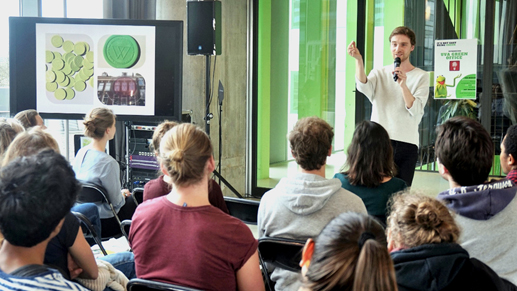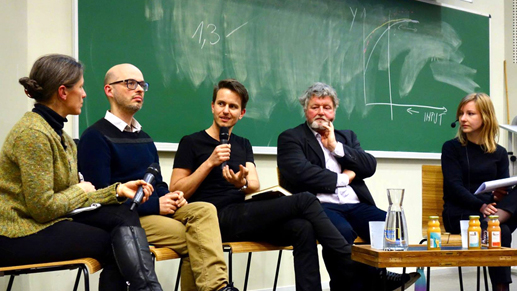What is a sustainable university?
You’re currently studying or working at a university, and you’re interested in sustainability. Now you’re wondering, what your university can do to help address climate change, biodiversity loss and social inequality. In this post, you learn what questions to ask to discover how green your university already is.
A sustainable university is an educational institution that educates global citizens for sustainable development, offers relevant insights on urgent societal challenges and reduces the environmental and social footprints of its campus operations, empowers students and staff to act, and makes sustainability a central priority.
Let’s explore five aspects of a sustainable university:
- 1. Education: Empower global citizens for sustainable development
- 2. Research: Discover answers to important social questions
- 3. Operations: Achieve a zero footprint for campus operations
- 4. Community: Empower students and staff to act on sustainability
- 5. Governance: Make sustainability a priority for your organisation

Universities grant the highest degrees of the education system: Bachelor, Master and PhD degrees. In this way, they help shape the economic and political leaders and managers of tomorrow. Ask yourself the following questions to find out if your university fosters or hinders sustainability education:
(1) Goal: Does our university want students to become obedient citizens or passive consumers? Or does teaching aim to educate global citizens for sustainable development?
(2) Topics: Does the curriculum address topics from a social, economic and environmental perspective? For example, do engineering students just learn about constructing a building in the most cost-efficient manner? Or do they learn how to construct a zero-energy building that provides long-term benefits to its occupants?
(3) Real-life learning: Do students explore real-life questions through projects and case studies? Or do they just passively learn in the classroom, by listening to lectures all day? Sustainability education is problem and learner-focused.
One important role of a sustainable university is to empower students to learn about sustainability in an inter-disciplinary and learner-centred way. For more in-depth reading on education, please check out our blogpost on Education for Sustainable Development.
Sign-up to the FREE online course to establish your Green Office
5 weeks. One email per week. Unsubscribe at any time. By signing up, you agree to our data policy.
Through research, academics at a sustainable university can find answers to important social questions. Ask yourself the following questions to find out if your university fosters or hinders sustainability research:
(1) Problem ownership: Who defines what research is being done? Do academics conduct research for authoritarian governments on how to make their weapons more lethal or better spy on their population? Or do academics help to find solutions to world hunger, economic inequality, or climate change?
(2) Research methods: How is research being done? Are research methods ethical and research projects run in an environmentally friendly way themselves? Do academics mainly fly to meetings or also leverage online conferencing technology? Is catering during project workshops and conferences meat-based or also fair-trade, organic and regional?
(3) Dissemination: Are research findings published in academic journals that only scientists will read? Or do research results help to educate the general public and are accessible to all? To what extent does research lead to new policies, technologies and patents that positively impact society?
Your university’s research can help to contribute to sustainability transitions if questions are socially relevant and findings made accessible to all.

Education and research don’t occur in a vacuum. Natural and societal resources are used in the process. Ask yourself the following questions to find out if your university fosters or hinders green campus operations:
(1) Buildings: Do buildings waste energy and lack waste recycling? Or are buildings equipped with solar cells, good insulation, waste separation or energy-efficient lighting, as well as certified with recognized sustainability standards, such as LEED or BREEAM?
(2) Procurement: To what extent do these procurement practices support or impede human rights, animal health and labour conditions – often in countries far away? Does your university have a sustainable procurement policy, such as the University of Reading’s Guide to Sustainable Procurement?
(3) Laboratories: Do initiatives exist to improve the environmental impacts of laboratories? How does your university support researchers to green laboratories?
Your university can promote sustainability by assessing and reducing the environmental and social footprints of buildings, procurement practices or laboratories.

Next to the formal education and research activities, universities also provide a community for students and staff. Ask yourself the following questions to find out if your university empowers students and staff to act on sustainability:
(1) Student groups: Are students group actively promoting sustainability? Do they try to make their events and promotional materials environmentally friendly?
(2) Extra-curricular activities: Is there a sufficient extra-curricular offer on sustainability? Can students and staff attend lectures or get involved as volunteers to advance sustainability?
(3) Staff engagement: Do departments promote sustainable behaviour at their offices? Are there opportunities for staff to get involved in sustainability next to their jobs?
In order to become a sustainable university, your university should create a community of sustainability changemakers through student groups, extra-curricular activities and staff engagement.

Individual projects to advance sustainability in education, research, operations and the university community are great, but you will only succeed in making major progress towards becoming a sustainable university if it is a strategic priority. Ask yourself the following questions to find out if your university is strategically set-up to become sustainable:
(1) Strategic priority: Is sustainability a core component of the university’s strategic programme? Or is there a separate sustainability policy, vision or plan that has been agreed on by the university’s management?
(2) Sustainability structures: Does your university have organisational units, like a staff sustainability department, Green Office or sustainability coordinator to manage sustainability? Are these actors taken seriously in the institution and do they receive sufficient resources to be effective?
(3) Monitoring: Are there monitoring mechanisms in place to make sure the university is actually making progress towards its sustainability goals? Does the university publish a sustainability report or calculate a carbon footprint?
Your university can more effectively advance sustainability in education, research, operations and the university community by making sustainability a strategic priority, introducing new organisational structures and monitoring its progress.
Learn more
Find out more about becoming a sustainable university:
Photos by Green Offices at the University of Amsterdam, University of Ghent and Groningen University.






